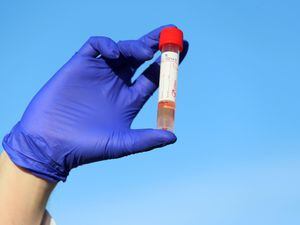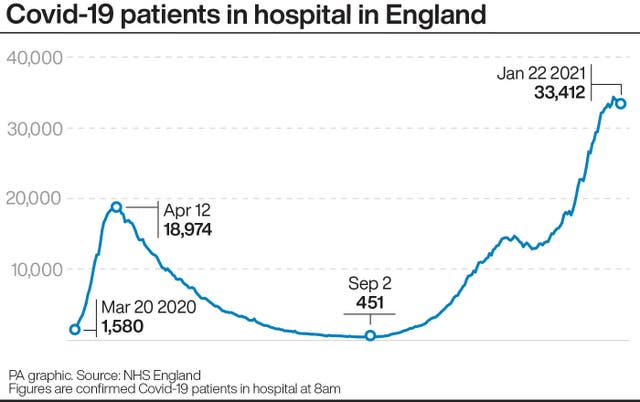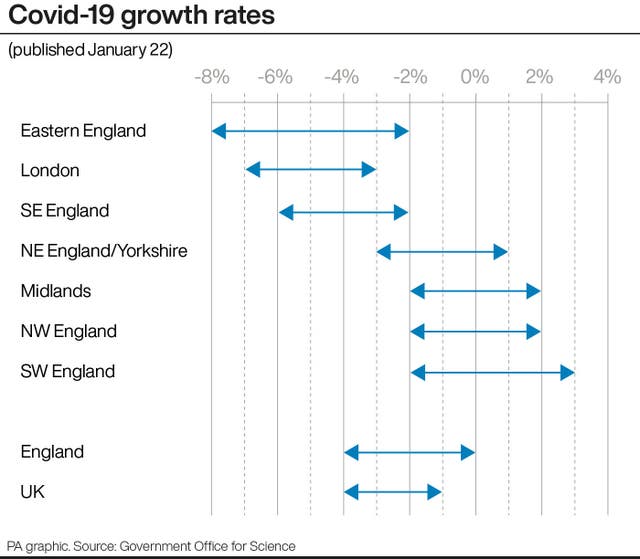Covid infections ‘will fall slowly even if R remains below 1 till mid-February’
R represents the average number of people each Covid-positive person goes on to infect.

Community prevalence of Covid-19 will be higher than it was during first national lockdown in the spring of 2020 – even if reproduction number, or R, remains below 1 until mid-February, scientists advising the Government have said.
In a document released by Scientific Advisory Group for Emergencies (Sage) on Friday, the experts have said that prevalence would drop more slowly than seen during April and May last year.
It comes as the latest figures released by the Government on the same day showed R to be potentially below 1 across the UK, estimated to be somewhere between 0.8 and 1.

R represents the average number of people each Covid-positive person goes on to infect.
When the figure is above 1, it means the outbreak is growing exponentially and if it falls below 1, it means the epidemic is retreating.
Data shows that, at present, Covid-19 infections are falling somewhere around a quarter every fortnight, compared with a halving back in April.
Sage warned on Friday that coronavirus cases remain “dangerously high and we must remain vigilant to keep this virus under control”.
It is thought that a combination of factors, such as highly-transmissible new variant of coronavirus circulating in the UK and the slightly lesser restrictions in the current national lockdown compared to the first one, could be contributing to the slower decline.
The document dated January 6 from SPI-M, a sub-group of Sage, said: “In spring 2020, hospital occupancy peaked around three weeks post-lockdown and took another four weeks to halve.
“It is highly likely that hospital occupancy will be at or above its current levels in mid-February.”

Meanwhile, data from the Office for National Statistics (ONS) infection survey has shown a slight drop in the number of people infected with coronavirus in England after lockdown measures were introduced.
The ONS estimated one in 55 people in private households in England had Covid-19 between January 10 and 16, down from one in 50 people for the Christmas period of December 27 to January 2.
While declining infections offer hope, scientists across the UK are urging people to look at the data with cautious optimism.
Although estimates of R are based on data available up to January 18, R is a lagging indicator, which means the effects of the latest measures – such as the current national lockdown – are only starting to be reflected in the latest data.
Dr Simon Clarke, associate professor in cellular microbiology at the University of Reading, said: “As tempting as it is to find some cause for celebration in infection rates that are beginning to fall, as seen in both ONS data and the Government’s publication of the R number, we still see very high levels of Covid-19 in every region of the UK.
“The national lockdown in England, and equivalents in Wales and Scotland, are beginning to arrest the spread of Covid, including the new variant seen in this country.
“However, the lag between infections and then hospitalisations and deaths mean that healthcare services still face unprecedented demand, and we are still likely to see recorded deaths continue to increase for some time yet.”
Dr Konstantin Blyuss, reader in mathematics at the University of Sussex, described the latest figures as “great news”, but added: “We have to be cautious not to overlook the fact that in parts of the country, and more specifically, the North East and the Midlands, the prevalence has actually increased since last week, indicating that the infection is still growing in those regions.
“One particular aspect of the story is that the proportion of cases associated with the new more infectious strain is also changing in time, therefore, we still have to wait and see whether this overall reduction of the R number in England will continue over the coming weeks.”





